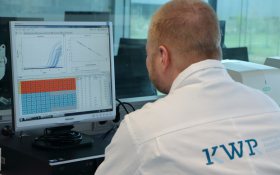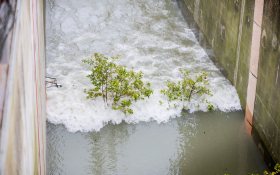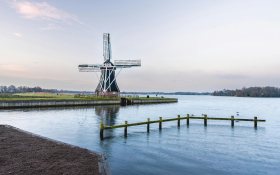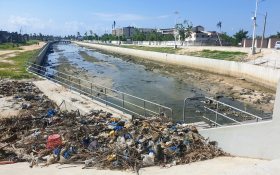PhD-student experimented with 10.000 plastic river plants in waterlab, the Netherlands
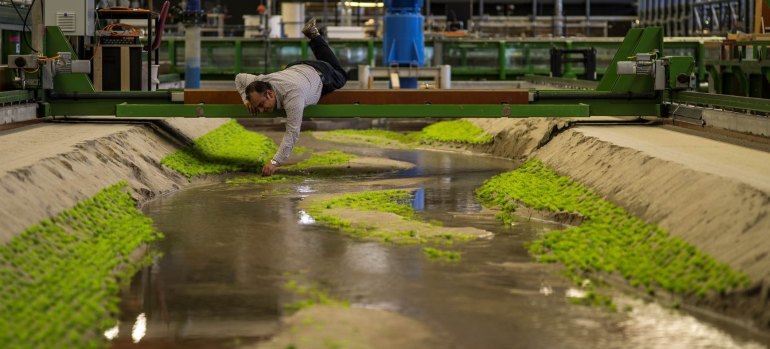 In the main channel of the waterlab at Delft University of Technology in the Netherlands, PhD-student Andrés Vargas-Luna simulated the shaping of rivers including the effects of vegetation. He did this by putting 10.000 small plastic plants in the channel.
In the main channel of the waterlab at Delft University of Technology in the Netherlands, PhD-student Andrés Vargas-Luna simulated the shaping of rivers including the effects of vegetation. He did this by putting 10.000 small plastic plants in the channel.
It is the first time such quantitative data has been collected on the behaviour of rivers.
Vargas defends his PhD-thesis on 15 November.
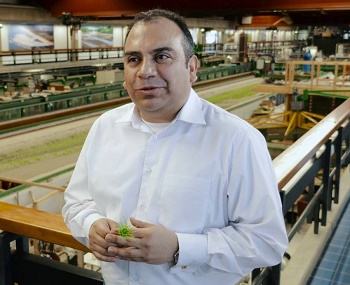 PhD-student Andrés Vargas-Luna is assistant professor at Pontificia Universidad Javeriana in Colombia
PhD-student Andrés Vargas-Luna is assistant professor at Pontificia Universidad Javeriana in Colombia
Development of river banks
There is a rising awareness of the need to include the effects of vegetation in studies dealing with the behaviour of rivers.
There are currently multiple models that use the strength of the flow to calculate how the banks erode.
Vargas: “But problems arise when trying to calculate their extension as there are no models for this. It is often assumed that the land that erodes from one bank, expands the other. I want to know which role vegetation plays in the development of riverbanks.”
The outcomes of his research emphasize the relevance of considering the effects of vegetation on the river management and on the designing, planning and maintaining of restoration projects.
Development of sandbanks
Vargas started his experiment at the lab with a straight, narrow, elongated channel in the large flume. He created scenarios with and without vegetation, allowing sandbanks to develop as well as erosion on the other side. He repeated this and placed vegetation on the flood plains, as well as on the sediment bars.
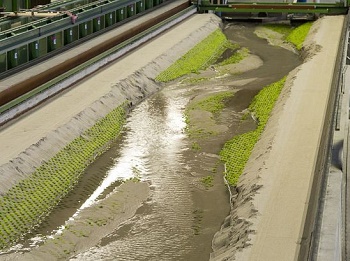 Lots of work, lots of fun
Lots of work, lots of fun
Vargas opted for small plastic plants to study the role of vegetation. “We put 10,000 in the main channel. That was really fun, but an awful lot of work. We did it in one hour shifts. It was impossible to last any longer as you were upside down and this led to cramping arms.”
However, according to Vagras it was worth it. “We collected unique data! Elsewhere this has only been studied in miniature, with solely qualitative results.”
Andrés Vargas-Luna is Assistant Professor of the Hydraulic and Environmental group at Pontificia Universidad Javeriana (Bogota, Colombia).
He is advancing his doctoral studies within the Civil Engineering and Geosciences Faculty at Delft University of Technology.
(top photo by Picture: TU Delft/Frank Auperlé)
Read also on this website
• Official opening Metronome tidal facility to simulate river flows at Utrecht University, the Netherlands, 14 January 2016
• Delft University of Technology starts free online course on Building with Nature, 29 November 2015
• Delft coastal researchers win US challenge with spectacular movie Drones at the Beach, 31 March 2015
More information
Civil Engineering and Geosciences Faculty
Delft University of Technology
Delft, the Netherlands
+31 15 27 89 802
www.citg.tudelft.nl/en
Interview with Andrés Vargas explaining his study at the waterlab of the Delft university of technology.
